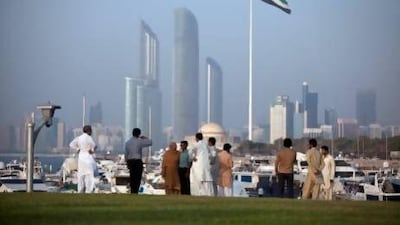Being able to make choices is often a luxury, but sometimes it can be a burden. In the latter case, it's better that the choice is made for you. Eid is an occasion that makes that choice for us - to come together, exchange greetings and join in the festivities.
Although each year there seems to be concern over news and negative attitudes that threaten to dampen the mood, Eid remains an occasion of joy regardless of moods.
Festivals are obviously meant to be celebrated. Not only did productive societies in ancient times work through different seasons but they also delivered more creatively, economically and emotionally during those holidays.
But festival holidays lately seem to place a heavy emotional load on people who do not feel the need to fully take part in celebrations. Reasons may range from debts to distress, although other aspects such as changes in society could also play their part.
These days a holiday, whether once a year or during the week, is about finding a getaway or making a personal plan. This free setting may seem ideal but at the same time it overlays the value of the main occasion.
At least since the Panathenaic festival, held in Athens in 566BC, societies have come together to honour deities, rivers and mountains. All were religiously celebrated during a particular season with shared beliefs.
Every four years, a grand procession began 20 days of festivities in Athens. From the northern part of Athens, maidens draped in embroidered quilts dyed in saffron paraded for the goddess Athena. Then cows were sacrificed and the meat was distributed. Some believe that the Olympics originated at that time.
Even today, praying together and holding community feasts are what mainly make up any major festival, just like Eid. Thus, the tradition of festivals remains unchanged.
None of the festivities was grander in breaking day-to-day routines than those of ancient Egypt.
During the New Kingdom, Amun, a local deity of Thebes, was celebrated in the festival of Opet in the second month of the lunar calendar. That was a time of floods, so without any work to do, Thebans welcomed the holy days.
Priests opened the temple doors to the entire Egyptian population, giving them a chance to pray for their loved ones and present offerings to Amun. It is recorded that one year, 11,341 loaves of bread and 385 jars of beer were distributed to the people.
That festival has long since disappeared but another with ancient origins, that of the Bride of the Nile, is still celebrated in Egypt today.
Before the time of Prophet Mohammed, two days of celebrations were traditionally held by the people of Al Madina. After the advent of Islam, the Prophet said: "Allah has replaced your two days of games with two superior days", meaning the days of Eid. Prophet Mohammed was known to dress in a different manner at Eid and would walk to greet families along one path and then return by another path, so as not to not miss anyone on either side of the route he took.
Especially in the UAE, occasions such as Eid do not take place without the whole country taking part in some way. Our leaders receive crowds of well-wishers and generously announce amnesties for hundreds of prisoners, often paying their debts so that they can start their lives afresh.
At dawn, five prayer calls from the mosques are heard. After the prayer ends, the starting line of Eid visits hits off. Kids race to collect their eidya (cash gifts for children) while elders meet as many family and friends as the morning hours allow.
The preparations for Eid celebrations in the UAE, as in other Muslim countries, start during Ramadan. Everywhere in Abu Dhabi, we see decorations, adorning main streets and private homes. Various genres of TV programmes - from religious to comedy - specially made for Ramadan and Eid, are eagerly watched by families in every home.
With unlimited choices of distractions within our reach, nothing is more significant than our shared yearly holiday, Eid. For all of us, it is an occasion to express our faith and celebrate our tradition.
It's a holiday that we must celebrate to spread our joy.
Sheikha Alyazia bint Nahyan Al Nahyan is a documentary filmmaker and painter

